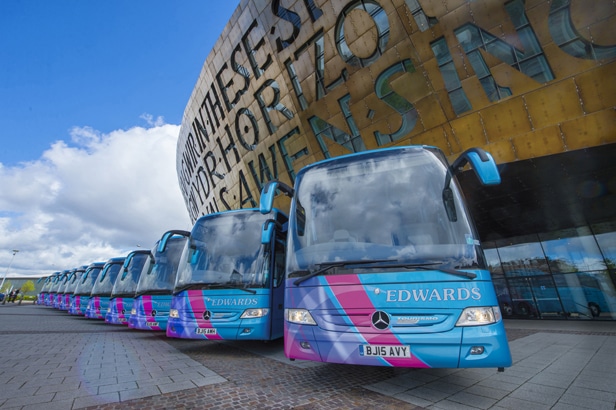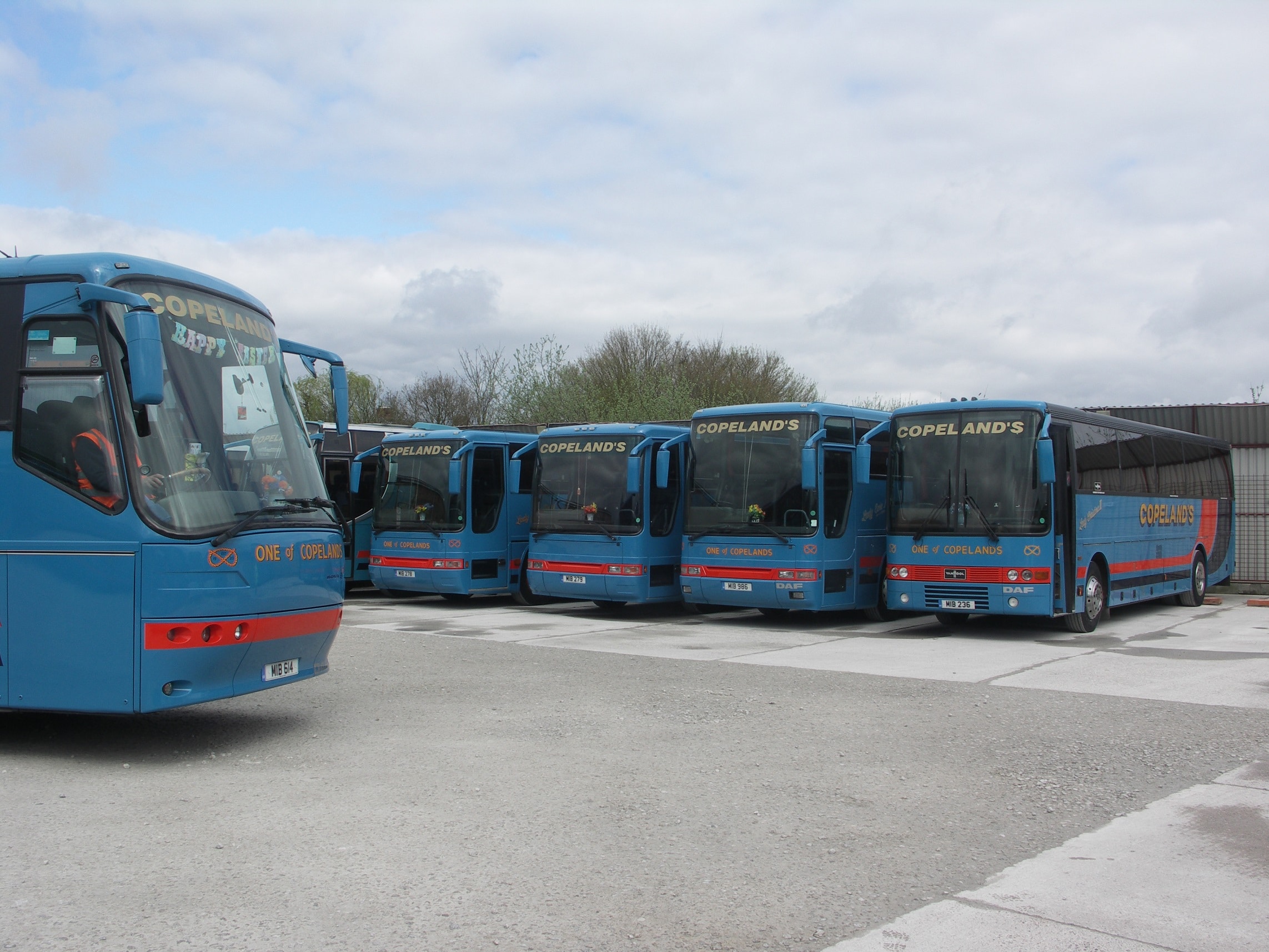It is around a year since membership of trade body RHA formally opened to operators of coaches. Since then, its work with those businesses has been led by Andy Warrender as Operations Manager – Coach Sector. He has observed changes in the segment over that period with the benefit of significant industry experience.
As recovery has proceeded in more recent months, it has led coach companies’ thoughts away from managing the impact of COVID-19 and back towards operational considerations. RHA will stage the first National Coach Week in April, to which it has opened the door to other industry representative bodies. Meanwhile, some longstanding sector difficulties – including accessibility – remain as prominent as ever, and new ones – such as sending vehicles abroad in a post-Brexit world – have started to come to notice.
What is clear is that business is coming back to the coach industry, Andy explains. In private hire, there are what he terms “mixed reports” of the strength of that return. Momentum gained later in 2021 was hit hard by Omicron, but work is rebounding once again, albeit at a modest pace for some firms. It is often the case that customers are booking at short notice.
Messaging from governments in 2020 around the virus transmission risk on shared transport has stuck in some people’s minds, he adds. Regrettably, it is something that will take time to undo in some cases.
European work coming back for RHA Coaches members
The volume of European work for coaches has grown with the onset of ski season and the relaxation of restrictions in other countries, RHA has found. But the landscape there has changed since 2020. While most border enforcement measures currently revolve around COVID-19 precautions, Andy expects that to shift in due course towards a focus on Brexit-related matters.

For operators that regularly venture abroad, particular care is required where drivers are concerned, he adds. That relates to the rule that British citizens may be present in Schengen Area countries without a visa for no more than 90 days in any 180-day block.
“This is a big thing for a small majority of coach operators and drivers. Businesses must also consider holidays that drivers take within the Schengen Area when calculating totals,” he says.
Feedback from RHA’s freight sector members suggests that thus far, enforcement of the 90/180-day rule is “light touch.” However, that could change, and in a worst-case scenario the driver could be refused permission to cross a border. RHA’s stance is that operators should instruct staff bound for the Schengen Area to obtain passport stamps for each entry and exit. If records are missing, officials may over-calculate the number of days spent there.
“The 90/180-day rule could potentially limit the volumes of overseas work that can be handled by operators and drivers that specialise in that area,” he continues. “Whether the number of coaches travelling outside the UK will return to pre-Brexit volumes is something we can only guess at, but it is encouraging to hear that air travel to the EU is expected to see an upsurge this year. If that is the case, it suggests that there is an appetite among travellers to go there.”
PSVAR: Problems with LAs not taking accessibility seriously
While a return of work both domestically and overseas is welcome, challenges around PSVAR remain a major concern of RHA coach operator members. Andy underlines the Association’s stance that an accessible coach does not automatically mean an accessible journey, although work towards aligning the two could accelerate if a change to the way lifts deploy can be designed.
A particular item of consternation has come to light since Under-Secretary of State for Transport Baroness Vere wrote to coach industry trade bodies about PSVAR in July 2021 (PDF). In her letter, Lady Vere included local authorities (LAs) among the parties that “must focus now on how they can provide services inclusively rather than seeking to avoid their legal obligations.”

In some cases where contracts for in-scope home-to-school services have been awarded since then, that instruction has been ignored by LAs. “Some are not adhering to what the letter said,” Andy notes. “They are still issuing contracts based solely on price despite there being an accessible option on the table.”
One notable case has seen an LA “ride roughshod” over the approach directed by Lady Vere. “Operators have invested heavily in PSVAR and put their businesses under pressure by doing so. But the LA concerned is not interested in procuring accessible vehicles.”
RHA has raised such occurrences with the Department for Transport (DfT). It continues to engage with DfT on the PSVAR review process that is expected to report by the end of 2023, but Andy cautions that there should be no anticipation of it leading to a climbdown from the current position. “Anyone expecting that will be disappointed. Instead, the focus must be on more than just the vehicle. There needs to be a greater emphasis on the end user and what they want.”
One positive element around PSVAR is that DfT has displayed “a much better level of engagement” with the coach sector in that respect over the last year. It is thus imperative that stakeholders – operators included – contribute to the review when they are able to.
Facilities for coaches again under the microscope, RHA notes
RHA recently introduced a campaign focusing on skills in the sectors that it serves. Work of that kind will expand to the environment and facilities in due course. In the latter sphere for coaching, parking is again under the microscope. With some areas seeing little to no coach activity over the course of the pandemic it was sometimes difficult to gauge where bays had been repurposed, but with a strong return of domestic tourism, including to London, efforts must once more be targeted at ensuring spaces are available.

“We expect that operators will find that some bays remain unavailable, but the removal of COVID-19 testing facilities is likely to go some way to freeing up space that had been used for other things,” says Andy.
That return of tarmac to use as coach parking should also be underway at venues. While a reluctance among some of them to even accept coaches reduced in 2021, it is too early to say whether all attractions will welcome groups as openly as they did during the 2019 season.
However, it is clear via feedback from RHA coach operator members that some hotels have refocused themselves towards families and individual travellers. That may bring pressure on room availability for coach groups during the coming months. However, Andy counters that with the observation that a reopening of travel to Schengen Area countries should make life easier for coach operators needing to secure domestic accommodation.
National Coach Week preparations forging ahead
Centrepiece of RHA’s efforts around coaches in 2022 will be National Coach Week. It will open on 1 April, and in concept it echoes National Lorry Week, which RHA launched seven years ago. National Coach Week will be built around raising the industry’s prominence across the piste.
“Throughout the pandemic, coaching did not gain traction with Westminster,” Andy explains. “A lot of that was down to a lack of understanding about what the sector is and what it does.” In England, the industry “is still largely invisible in many ways,” he continues. “Coaches are now more prominent in Northern Ireland and Scotland, as demonstrated by support schemes. The Welsh Government has assisted the sector in Wales through its wider works that captures tourism businesses. But there has been no recognition in England.”

Because of that, RHA believes that it is important the industry collectively gets itself into a situation “where it will never face that again, and is better placed for Westminster to understand what it does for the economy.”
National Coach Week will thus see engagement with local and national politicians alongside efforts to raise the sector’s profile among other stakeholders and the public.
To support National Coach Week, Irizar UK has agreed to provide a vehicle that will be branded. RHA will directly spearhead a small number of events, but activities will largely be member-led with support from the Association and the loaned Irizar. Further information will be released soon.
“We don’t expect to overhaul the government’s view with 2022’s work. That will take a long time. Instead, National Coach Week will assist that process. It’s not possible to win every heart and mind, but we are confident that our efforts will help to demonstrate the vital economic importance of coaches,” Andy concludes.
























